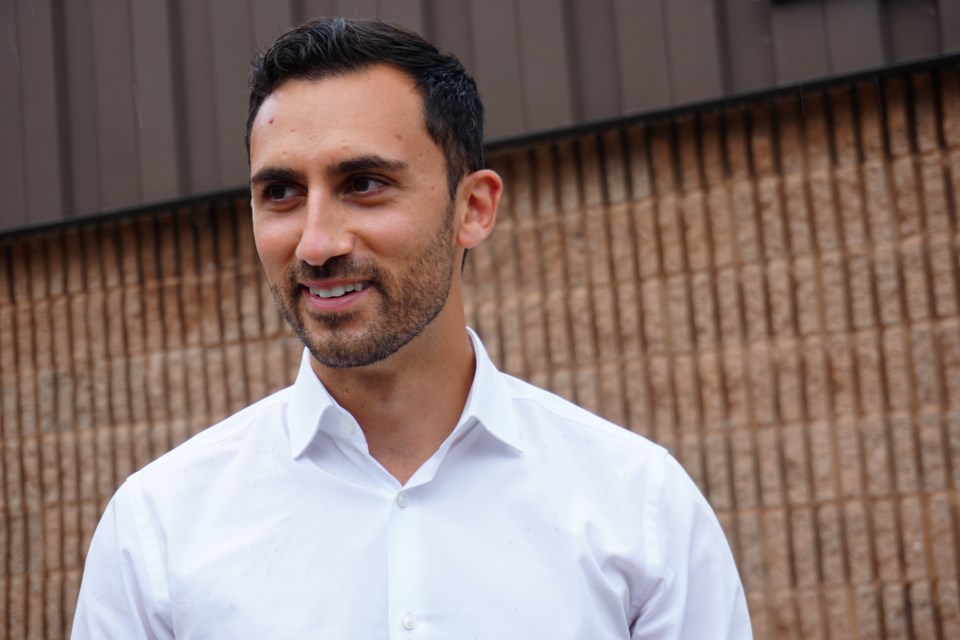EDITOR’S NOTE: This article originally appeared on The Trillium, a Village Media website devoted to covering provincial politics at Queen’s Park.
The Ford government is launching another massive energy procurement process — but Wednesday’s announcement included a key change from a past promise.
The province will include natural gas facilities in the list of sought-after energy generation technologies. Former energy minister Todd Smith, who left politics two weeks ago, previously said it would only be open to non-emitting resources like wind, solar, hydro, and nuclear.
Last month, The Trillium reported the change could be on the horizon but Energy Minister Stephen Lecce’s office wouldn’t confirm or deny.
“The first procurement was technologically agnostic, as well. So we're maintaining that consistency. We need an all of the above approach because we need more energy in this province,” Lecce said on Wednesday when asked about the reversal.
Earlier this year, the province concluded the first round of long-term procurement, which eyed 4,000 megawatts of energy — enough to power about four million homes — from facilities that could come online between 2026 and 2028.
Altogether, the first round netted the province about 2,700 megawatts from battery storage, 700 megawatts from natural gas and biomass plants, and about 300 from upgrading existing facilities.
The province didn’t need the 4,000 megawatts but set it as a target to ensure it didn’t fall short.
Wednesday’s announcement is after 2,000 megawatts from facilities that could start producing power in the early 2030s.
Lecce also ensured municipalities will still be “in the driver’s seat” because they have to pass a “support resolution” before any project goes forward.
“That means that new generation capacity will only be built if a municipality is comfortable. Period,” said Agriculture Minister Rob Flack.
The Tories put the policy in place after the previous Liberal government faced backlash when trying to expand wind power in parts of the province.
Westport Mayor Robin Jones, president of the Association of Municipalities of Ontario (AMO), cheered the news.
“AMO commends the province for investing in clean energy and empowering municipalities to assess the suitability of energy projects for our communities,” she said.
Getting municipal consent isn’t the only restriction Lecce’s imposing on new projects.
He’s banning all projects in specialty crop areas and won’t allow ground-mounted solar in prime agricultural areas to prevent solar farms.
Fruits and vegetables like peaches, cherries, carrots, and onions are grown in specialty crop areas. The province affords those lands the highest level of protection because the crops and economically important and the land can’t be rehabilitated if lost.
Agricultural impact assessments will also be needed for any project permitted in a prime agricultural area.
“It means that as we grow our energy infrastructure, we will have a process in place to protect the land that sustains us and feeds us,” Flack said.
On the other hand, Lecce is also providing some incentives for projects in northern Ontario.
Companies that set up shop in the north or partner with Indigenous communities will get bonus points on the procurement scorecard, he said.
Liberal energy critic Ted Hsu said Wednesday’s announcement was a step in the wrong direction on climate policy.
“We have to get off burning fossil fuels in the long term. We're using natural gas as a transition energy source, and we understand that. But the announcement today really didn't talk about sustainability,” he said in an interview.
Hsu said he’s in favour of municipal support resolutions and creating more protections for agricultural land, but added the latter is a bit ironic coming from the Tories.
“If you want to protect prime agricultural land, I’m going to hold you to it, because when it comes to urban sprawl, when it comes to what’s happening in Waterloo Region and assembling farmland for industrial purposes, what about that prime agricultural land?” Hsu said.
NDP environment critic Sandy Shaw and Green Leader Mike Schreiner also zeroed in on the reversal.
“Today’s announcement signals that Doug Ford and his politicians are opening the gates for more gas-powered projects instead of focusing on future-proofing our province’s energy strategy. Lecce may say his approach is ‘tech-agnostic.' Unfortunately, all it does is push Ontario further away from our goal of having an affordable and clean energy grid,” Shaw said in a statement.
“Any future that includes fossil gas expansion is not a future that puts Ontarians first. These are facts, and any responsible government would do well to pay attention to them,” Schreiner said in a statement.
